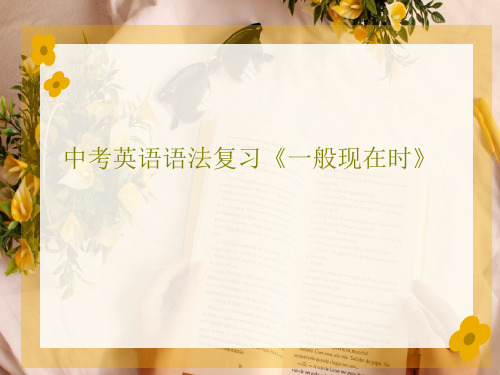中考英语一般现在时语法专题讲解课件(20张)
合集下载
中考英语语法复习《一般现在时》30页PPT

中考英语语法复习《一般现在时》
6
、
露
凝
无
游
氛
,
天
高
风
景
澈
。
7、翩翩新 来燕,双双入我庐 ,先巢故尚在,相 将还旧居。
8
、
吁
嗟
身
后
名,于我来自若浮烟
。
9、 陶渊 明( 约 365年 —427年 ),字 元亮, (又 一说名 潜,字 渊明 )号五 柳先生 ,私 谥“靖 节”, 东晋 末期南 朝宋初 期诗 人、文 学家、 辞赋 家、散
文 家 。汉 族 ,东 晋 浔阳 柴桑 人 (今 江西 九江 ) 。曾 做过 几 年小 官, 后辞 官 回家 ,从 此 隐居 ,田 园生 活 是陶 渊明 诗 的主 要题 材, 相 关作 品有 《饮 酒 》 、 《 归 园 田 居 》 、 《 桃花 源 记 》 、 《 五 柳先 生 传 》 、 《 归 去来 兮 辞 》 等 。
1
0
、
倚
南
窗
以
寄
傲
,
审
容
膝
之
易
安
。
谢谢
11、越是没有本领的就越加自命不凡。——邓拓 12、越是无能的人,越喜欢挑剔别人的错儿。——爱尔兰 13、知人者智,自知者明。胜人者有力,自胜者强。——老子 14、意志坚强的人能把世界放在手中像泥块一样任意揉捏。——歌德 15、最具挑战性的挑战莫过于提升自我。——迈克尔·F·斯特利
中考英语时态讲解一般现在时课件(23张)

Question& short answer 一般疑问&回答
I live in Tangshan. Do you live in Tangshan? Yes, I do. No, I don't.
She lives in Tangshan. Does she live in Tangshan? Yes, she does. No, she doesn't.
•They always have/has breakfast at home. √
•Layla's mum go/goes to work by bus. √
•We study/studies English at school. √
•I never play/plays computer games at school. √
肯定句
•I live in Tangshan. •We live in Tangshan. •She lives in Tangshan.
•I wash my face everyday. •You wash your face everyday. •He washes his face everyday.
Present Simple
一般现在时
过去
现在
将来
used for用法: 1. 一般性事实。 something that is always or usually true
eg. I live in Tangshan. The sun rises from the east.
2. 规律性或重复性动作 regular or repeated events eg. They walk to school everyday. Fergus often sits out side alone.
中考英语 一般现在时态语法讲解课件

3 规则动词的单三形式的变化规则
(1)大多数动词直接加 s
(2)以字母s x ch sh o 结尾的动词加 es
(3)以辅音字母+ y 结尾的动 词先变y 为 i 在加es
4 不规则动词的单三形式
have—has be----is
5 Fill in the blanks 10 ______ he _____ (read) English in the morning? Yes, he______.
1 My father _______ (work) in a school. (1)大多数动词直接加 s
Liu ______ (drive) to work.
works
5 Danny _______ (go) to school by bus.
No, she doesn’t.
2 Da Chao _h_a_s____ (have) a car. 特殊疑问词+does+ 主语+ 动原+其它?
主语+doesn’t + V.(动词原形)+其它
(3)一般疑问形式
Does she work in a school? Yes, she does. No, she doesn’t. Does Danny go to school by bike. Yes, he does. No, he doesn’t. Does your father have a car? Yes, he does. No, he doesn’t. Does she get up at 6:00 in the morning? Yes, she does. No, she doesn’t.
(1)大多数动词直接加 s
2025年中考英语一般现在时复习课件(共21张PPT)

+_s_ walk—walks 将_y_改为 _i_+_e_s_ fly—flies
+_e_s_ watch—watches
一些以__o__结尾的动词
+_e_s_
have的第三人称单数为has
go—goes do—does
练一练
come-- comes go-- goes stay-- stays teach-- teaches eat-- eats fish-- fishes fix-- fixes discuss-- discusses do-- does fly-- flies have-- has play-- plays study-- studies work-- works finish-- finishes
e.g. He is not (isn’t)a worker. You are not (aren’t) thirteen. They are not (aren’t) in the classroom.
一、 be 动词的一般现在时的句式
一般疑问句:Be+ _主__语___+ _其__它___?
e.g. Is he a worker?
0%
never 从未
一般现在时态的基本句式:
一、 be 动词的一般现在时的句式:
肯定句:_主__语__+_b__e_+表语(n., adj. ,num.等)
e.g. He is a worker. You are thirteen. They are in the classroom.
否定句:_主__语___+_b__e_+ _n_o_t_+表语
我每天骑自行车上学。
最新初中英语-一般现在时课件教学讲义ppt课件

☺一般疑问句:Be+主语+表语?
e.g. Is he a worker? Yes, he is./No, he isn’t. Are you thirteen?
Are they in the classroom? Yes, they are. No, they aren’t.
☺特殊疑问句:疑问词+be+主语?
特殊疑问句:疑问词+ do/does+主语+v.+其他?
e.g. What do you want? (she) What does she want? What time do you have lunch? What time does she have lunch? What do you do? What does she do? How do you spell it? (he) How does he spell it? How do you like Chinese food? How does he like Chinese food? How many tomatoes do you want? How many tomatoes does he want? How do you go to work? (your father) How does your father go to work?
否定句:☺主语(He/She/It)+does +not+v.+其他 e.g. He doesn’t study in a high school. Lucy doesn’t have a pet.
一般疑问句:☺Does+主语(he/she/it)+V.+其他? e.g. Does he study in a high school? Does Lucy have a pet?
e.g. Is he a worker? Yes, he is./No, he isn’t. Are you thirteen?
Are they in the classroom? Yes, they are. No, they aren’t.
☺特殊疑问句:疑问词+be+主语?
特殊疑问句:疑问词+ do/does+主语+v.+其他?
e.g. What do you want? (she) What does she want? What time do you have lunch? What time does she have lunch? What do you do? What does she do? How do you spell it? (he) How does he spell it? How do you like Chinese food? How does he like Chinese food? How many tomatoes do you want? How many tomatoes does he want? How do you go to work? (your father) How does your father go to work?
否定句:☺主语(He/She/It)+does +not+v.+其他 e.g. He doesn’t study in a high school. Lucy doesn’t have a pet.
一般疑问句:☺Does+主语(he/she/it)+V.+其他? e.g. Does he study in a high school? Does Lucy have a pet?
初中一般现在时(精讲)ppt课件

friends. • 6、Those chairs aren’t(not) broken. • 7、The bag isn’t(not) mine.
精选课件
20
情态动词的一般现在时
• 构成 主语 + 情态动词 + 动词原形+其他 She can speak English.
注意:情态动词后的动词一定要用原形
Does he like playing computer?
He plays computer once or twice a week.
• play the computer
精选课件
5
Is yaoming good at playing basketball?
Yes,he is good at playing basketball.
Is yaoming good at playing basketball?
No, he does not / No, he doesn’t
play basketball
精选课件
6
how about this?
chessboa精r选d课件 棋盘
7
Do you like this sport? No, I never play chess. No, I seldom play chess.
1. My father_l_is_t_e_n_s_(listen) to the radio every day.
2. Mike_st_u_d_i_e_s_ (study) in a middle school.
3. She_t_a_k_e_s_(take) Eddie for a walk after supper.
精选课件
20
情态动词的一般现在时
• 构成 主语 + 情态动词 + 动词原形+其他 She can speak English.
注意:情态动词后的动词一定要用原形
Does he like playing computer?
He plays computer once or twice a week.
• play the computer
精选课件
5
Is yaoming good at playing basketball?
Yes,he is good at playing basketball.
Is yaoming good at playing basketball?
No, he does not / No, he doesn’t
play basketball
精选课件
6
how about this?
chessboa精r选d课件 棋盘
7
Do you like this sport? No, I never play chess. No, I seldom play chess.
1. My father_l_is_t_e_n_s_(listen) to the radio every day.
2. Mike_st_u_d_i_e_s_ (study) in a middle school.
3. She_t_a_k_e_s_(take) Eddie for a walk after supper.
初中英语一般现在时学习(共25张)ppt课件

.
be 的用法口诀
我用am,你用are, is连着他,她,它; 单数名词用is, 复数名词全用are。
.
Exercise
• 1、Kitty ( ) an English girl. • 2、We ( ) students. • 3、I ( ) from Taizhou. • 4、She ( ) tall. • 5、Lucy and Lily ( ) good friends. • 6、Those chairs ( ) broken. • 7、The bag ( ) mine.
go-goes [z] do-does [z] have--has
.
• 一、 写出下列动词的第三人称单数
• talk______forget______hope______stop______ play______say______buy______worry_____
• fly______study_______like_______make_____ • give______see______swim______wash_____
Maplay football
play(第三人称单数) plays He always ( ) football on Saturdays.
.
• 1、大多数动词在词尾直接加s, 如read → reads look→ looks play→ plays
.
Exercise
• 8.I ( ) a boy. • 9.You ( ) a girl. • 10.He ( ) a teacher.
.
(二)、行为动词的一般现在时 1、肯定句的构成
主语 + 行为动词 + 其他
I get up at 7:00 every day.
be 的用法口诀
我用am,你用are, is连着他,她,它; 单数名词用is, 复数名词全用are。
.
Exercise
• 1、Kitty ( ) an English girl. • 2、We ( ) students. • 3、I ( ) from Taizhou. • 4、She ( ) tall. • 5、Lucy and Lily ( ) good friends. • 6、Those chairs ( ) broken. • 7、The bag ( ) mine.
go-goes [z] do-does [z] have--has
.
• 一、 写出下列动词的第三人称单数
• talk______forget______hope______stop______ play______say______buy______worry_____
• fly______study_______like_______make_____ • give______see______swim______wash_____
Maplay football
play(第三人称单数) plays He always ( ) football on Saturdays.
.
• 1、大多数动词在词尾直接加s, 如read → reads look→ looks play→ plays
.
Exercise
• 8.I ( ) a boy. • 9.You ( ) a girl. • 10.He ( ) a teacher.
.
(二)、行为动词的一般现在时 1、肯定句的构成
主语 + 行为动词 + 其他
I get up at 7:00 every day.
中考英语一般现在时趣味讲解动态课件(68张PPT)

问题思考
什么时候使用 一般现在时?
Scenario
Grammar
Pቤተ መጻሕፍቲ ባይዱactice
语法探究
GRAMMAR
探索发现
Sally usually walks to school.
探索发现
She passes the sweet shop, but she never buys sweets on the way to school.
• The earth is a planet and it goes around the sun.
语法秘籍
一般现在时态的用法 (2) 表示客观真理或永恒的状态 The earth goes around the sun.
I do
past
future
探索发现
打电话给航空公司 – This is Mary. I need to reserve a plane ticket. Is
回答问题
• 在这个故事中,什么时候使用了一般现在时?
回答问题
• 在这个故事中,什么时候使用了一般现在时? • 你能举出更多例子吗?
故事再现
Lions live in Africa and Asia. They kill other animals for food. Male lions have a mane鬃毛 of long hair around their face and neck. A female lion is a lioness, and her babies are lion cubs.
语法秘籍
时间频率副词
0%
100 %
always
usually
often
中考英语重点语法快速速记之一般现在时解读课件

4.My mother _lo_o__k_s__look) after my little sister at home.
5. Lucy ___h_a_s___(have) some friends here. 6.Fang Ming __d_o_e_s_n_’_t _li_k_e__(not like )rice at all. 7.We__g_o__(go)to school at 7:30 in the morning . 8.Mary seldom _c__o_m_e_s__ (come) here.
12.stay stays
二、根据汉语提示,完成句子。
1.迈克经常在图书馆里看书。
Mike often reads books in the library .
2.我爸爸每天早上七点起床。(广东广州)
My father gets
up at 7:00 every morning.
3.她住在悉尼吗?
Does she live in Sydney?
肯定回答:Yes, I can. / Yes, she can. 否定回答:No, I can't. / No, she can't.
常见情态动词can, must, may, should, shall等 情态动词后用动词原形 (情态动词是辅助,其后必要加动原)
三、含有行为动词 (主语非第三人称单数)
Yes, 主语+does. No, 主语+ doesn't.
注意: 在一般现在时态中,当谓语动词是行为
动词的时候,变否定和一般疑问句时,要借 助助动词do和does帮忙。当主语是第三人 称单数(she, he, it)的时候用does,其他人 称用do. 借助助动词do和does以后,动词 要用动词原形。
5. Lucy ___h_a_s___(have) some friends here. 6.Fang Ming __d_o_e_s_n_’_t _li_k_e__(not like )rice at all. 7.We__g_o__(go)to school at 7:30 in the morning . 8.Mary seldom _c__o_m_e_s__ (come) here.
12.stay stays
二、根据汉语提示,完成句子。
1.迈克经常在图书馆里看书。
Mike often reads books in the library .
2.我爸爸每天早上七点起床。(广东广州)
My father gets
up at 7:00 every morning.
3.她住在悉尼吗?
Does she live in Sydney?
肯定回答:Yes, I can. / Yes, she can. 否定回答:No, I can't. / No, she can't.
常见情态动词can, must, may, should, shall等 情态动词后用动词原形 (情态动词是辅助,其后必要加动原)
三、含有行为动词 (主语非第三人称单数)
Yes, 主语+does. No, 主语+ doesn't.
注意: 在一般现在时态中,当谓语动词是行为
动词的时候,变否定和一般疑问句时,要借 助助动词do和does帮忙。当主语是第三人 称单数(she, he, it)的时候用does,其他人 称用do. 借助助动词do和does以后,动词 要用动词原形。
中考英语总复习之一般现在时(共23张PPT)

your mother usually lunch ? 23. Li Xing goes home late. (变为一般疑问句)
Li Xing home late ?
24. Li Xing goes home late on Friday afternoon . (对画线部分提问) Li Xing goes home late ?
she often a drink of water after supper ?
31. That is an apple tree . (变为复数句)
32. Mike’s birthday is February 19th . (对画线部分提问) is Mike’s birthday ?
33. Come down to our new shop, please. (变为否定句) to our new shop, please.
三.用所给动词的适当形式填空。 1. My classmate (know) the man on the bike . 2. His sister usually (go) to school at 7:00 am . 3. Lin Tao (like) his new sweater . 4. Let me (have) a look . 5. Let’s (play) tennis !
Thank you!
10. The twins very happy because they want to go to a movie . 11. Our class big , but their class small . 12. The basketball club exciting and fun . 13. The girl in red clothes my sister . 14. Lily’s room not very big . 15. It _______ nice to meet you. 16. Your name _______ nice. 17. What class you in ?
Li Xing home late ?
24. Li Xing goes home late on Friday afternoon . (对画线部分提问) Li Xing goes home late ?
she often a drink of water after supper ?
31. That is an apple tree . (变为复数句)
32. Mike’s birthday is February 19th . (对画线部分提问) is Mike’s birthday ?
33. Come down to our new shop, please. (变为否定句) to our new shop, please.
三.用所给动词的适当形式填空。 1. My classmate (know) the man on the bike . 2. His sister usually (go) to school at 7:00 am . 3. Lin Tao (like) his new sweater . 4. Let me (have) a look . 5. Let’s (play) tennis !
Thank you!
10. The twins very happy because they want to go to a movie . 11. Our class big , but their class small . 12. The basketball club exciting and fun . 13. The girl in red clothes my sister . 14. Lily’s room not very big . 15. It _______ nice to meet you. 16. Your name _______ nice. 17. What class you in ?
初中英语语法一般现在时ppt课件

27
30. 窗前有一个花瓶。 There is a vase in front of the window. 31. 天空中飘着几朵云。 There are some clouds in the sky. 32. 桌上有几本杂志。 There are some magazines on the table. 33. 学校后面有一个公园。 There is a park behind the school. 34. 河里有一只船。 There is a boat on the river.
13
• 一般疑问句:
☺Does+主语(he/she/it)+动词原形+其他?
e.g. --Does he watch TV on Saturdays? --Yes, he does./No, he doesn't.
--Does Tim play basketball every day? -ห้องสมุดไป่ตู้Yes, he does./No, he doesn't.
e.g. I watch TV on Saturdays. They play basketball every day.
8
否定句: ☺主语(I/We/You/They)+do+ not+动词原形+
其他 e.g. I don’t watch TV on Saturdays. They don’t play basketball every day.
☺主语(He/She/It)+实义动词三单形式+其他
e.g. He watches TV at home on Saturdays. Tim plays football every day.
30. 窗前有一个花瓶。 There is a vase in front of the window. 31. 天空中飘着几朵云。 There are some clouds in the sky. 32. 桌上有几本杂志。 There are some magazines on the table. 33. 学校后面有一个公园。 There is a park behind the school. 34. 河里有一只船。 There is a boat on the river.
13
• 一般疑问句:
☺Does+主语(he/she/it)+动词原形+其他?
e.g. --Does he watch TV on Saturdays? --Yes, he does./No, he doesn't.
--Does Tim play basketball every day? -ห้องสมุดไป่ตู้Yes, he does./No, he doesn't.
e.g. I watch TV on Saturdays. They play basketball every day.
8
否定句: ☺主语(I/We/You/They)+do+ not+动词原形+
其他 e.g. I don’t watch TV on Saturdays. They don’t play basketball every day.
☺主语(He/She/It)+实义动词三单形式+其他
e.g. He watches TV at home on Saturdays. Tim plays football every day.
最新一般现在时(精讲)PPT课件

4.表示不受时间限制的普遍真理和自然规律: e.g. Two and four is six. The moon goes around the earth.
一般现在时的构成
一、系动词be的一般现在时 二、情态动词的一般现在时 三、实义(行为)动词的一
般现在时
• 一、系动词be的一般现在时
1、构成: 主语 + be + 其他
friends. • 6、Those chairs aren’t(not) broken. • 7、The bag isn’t(not) mine.
情态动词的一般现在时
• 构成 主语 + 情态动词 + 动词原形+其他 She can speak English.
注意:情态动词后的动词一定要用原形
Eg: They should(应该) be right. 试比较:They are right. She speaks English.
否定句的构成
主语 + 情态动词 + not + 动词原形 + 其他
can not = can’t could not = couldn’t must not = mustn’t would not = wouldn’t will not = won’t should not = shouldn’t may not = may not
26个字母中 除A E I O U五个元音字母外,其余 21个都是辅音字母
3、以“s, x, ch, sh”结尾的,在词尾加“es”,发 音为[iz] 如:
teach-teaches [iz]; watch-watches [iz] box--boxes
4、以“o”结尾的动词,加“es”,读[z] 如: go-goes [z] do-does [z]
一般现在时的构成
一、系动词be的一般现在时 二、情态动词的一般现在时 三、实义(行为)动词的一
般现在时
• 一、系动词be的一般现在时
1、构成: 主语 + be + 其他
friends. • 6、Those chairs aren’t(not) broken. • 7、The bag isn’t(not) mine.
情态动词的一般现在时
• 构成 主语 + 情态动词 + 动词原形+其他 She can speak English.
注意:情态动词后的动词一定要用原形
Eg: They should(应该) be right. 试比较:They are right. She speaks English.
否定句的构成
主语 + 情态动词 + not + 动词原形 + 其他
can not = can’t could not = couldn’t must not = mustn’t would not = wouldn’t will not = won’t should not = shouldn’t may not = may not
26个字母中 除A E I O U五个元音字母外,其余 21个都是辅音字母
3、以“s, x, ch, sh”结尾的,在词尾加“es”,发 音为[iz] 如:
teach-teaches [iz]; watch-watches [iz] box--boxes
4、以“o”结尾的动词,加“es”,读[z] 如: go-goes [z] do-does [z]
初中英语语法之一般现在时PPT课件

28
☺ 一般疑问句: Do+主语(非三单)+v.原形+其他? 肯定回答:Yes, 主语+do. 否定回答:No, 主语+don't. 1) _D_o_ you_s_t_a_y (stay) at home on Saturdays? 2) _D_o_ theyh_a_v_e_(have) sports every day? ☺Does+主语(三单)+v.原形+其他?
如果你接受这份工作,他们将和你谈谈细
15
6、表示格言或警句。 例如:Pride goes before a fall. 骄者必败。 注意:此用法如果出现在宾语从句中, 即使主句是过去时,从句谓语也要用 一般现在时。
16
一般现在时表达方法
主要通过谓语动词的变化和用时间词语来 表示,其中最主要的是谓语动词的变化。 一般现在时动词变化的规则是: 当主语为非第三人称单数,谓语动词用原型。 当主语为第三人称单数,谓语动词用第三人 称单数形式。e.g. 1. We often get up early in the morning. 2. My father often gets up early in the
13
4.普遍真理和自然规律: 1) Two and four is six.
二加四等于六。 2)The moon goes around the earth. 月亮绕着地球转。 3)Ten minus two is eight.十减二 等于八。 4)Light travels faster than sound . 光的速度比声音的速度快。
21
4.以辅音字母+o结尾的词,一般情况是在 词尾加es, 读作[z]
☺ 一般疑问句: Do+主语(非三单)+v.原形+其他? 肯定回答:Yes, 主语+do. 否定回答:No, 主语+don't. 1) _D_o_ you_s_t_a_y (stay) at home on Saturdays? 2) _D_o_ theyh_a_v_e_(have) sports every day? ☺Does+主语(三单)+v.原形+其他?
如果你接受这份工作,他们将和你谈谈细
15
6、表示格言或警句。 例如:Pride goes before a fall. 骄者必败。 注意:此用法如果出现在宾语从句中, 即使主句是过去时,从句谓语也要用 一般现在时。
16
一般现在时表达方法
主要通过谓语动词的变化和用时间词语来 表示,其中最主要的是谓语动词的变化。 一般现在时动词变化的规则是: 当主语为非第三人称单数,谓语动词用原型。 当主语为第三人称单数,谓语动词用第三人 称单数形式。e.g. 1. We often get up early in the morning. 2. My father often gets up early in the
13
4.普遍真理和自然规律: 1) Two and four is six.
二加四等于六。 2)The moon goes around the earth. 月亮绕着地球转。 3)Ten minus two is eight.十减二 等于八。 4)Light travels faster than sound . 光的速度比声音的速度快。
21
4.以辅音字母+o结尾的词,一般情况是在 词尾加es, 读作[z]
- 1、下载文档前请自行甄别文档内容的完整性,平台不提供额外的编辑、内容补充、找答案等附加服务。
- 2、"仅部分预览"的文档,不可在线预览部分如存在完整性等问题,可反馈申请退款(可完整预览的文档不适用该条件!)。
- 3、如文档侵犯您的权益,请联系客服反馈,我们会尽快为您处理(人工客服工作时间:9:00-18:30)。
sometimes
every day never on Sundays once a day
课上小练习
1. My father often ___B___ to work by bus.
A. go B. goes C. went D. is going
2. I often __A____ my parents at weekends.
一般现在时 Simple present tense ”
2020.9.10
He is Albert Einstein.
He is a great Scientist.
“ I like doing experiments and I read books and do experiments every day .”
以辅音字母加y结尾的动 词, 把y改i加-es
miss misses teach teaches go goes
study studies
fix wash do
fixes washes does
worry worries
特殊变化
have has
一般现在时 三、时间标志词
always
often usually
四、句型转换----改为一般疑问句
TF boys like singing very much.
改: Do TF boys like singing very much?
Do + 主语 + do(动原) + 其他?
Yes, 主 + do No, 主 + don't
My sister likes TF boys very much. 改: Does your sister like TF boys very much? Does+主语(三单) + do(动原) + 其他? Yes, 主 + does No, 主 + doesn't
My sister likes TF boys very much. 改: My sister doesn't like TF boys very much.
主语(三单) + doesn't + do(动原) + 其他.
TF boys are popular in China.
改: TF boys aren't very popular in China.
TF boys are popular in China. Be(Am, Is, Are) + 主 +其他?
改: Are TF boys very popular in China?
Yes, 主 + be
No, 主 + be not(可缩写)
课上小练习
1. Tom often goes to the park on Sundays. (变为一般疑问句)
一般现在时
She likes travelling on weekdays. She often teaches English on Sundays. Students like her class very much. Students think she is a good teacher.
主语 + be (am, is, are)not + 其他.
课上小练习
1. He is a good boy. (变为否定句)
He ___i_s_n_'_t_ a good boy.
2. He likes reading English news every morning.
He __d_o__e_s_n_'t _____li_k_e__ reading English news every morning.
A: 主语 + do(原形)/does(动词三单) + 其他 B: 主语 + be (am, is, are) + 其他
动词三单的变化
一般动词后直接加-s
stop stops read reads
make makes play plays
以ch, sh, s, o, x结尾 的动词, 在词尾加-es
“Between genius and deligence, I do not hestitate to choose the latter.
Contents: Simple present tense
一般现在时
定义 结构ss
Who is she ?
She likes travelling on weekdays. She often teaches English on Sundays. Students like her class very much. Students think she is a good teacher.
一、定义(Definition)
A: 表示经常性或习惯性的动作或存在的状态。 B: 表示客观事实或普遍真理。
一般现在时
二、结构(Structure)
She likes travelling on weekdays. She often teaches English on Sundays. Students like her class very much. Students think she is a good teacher. Failure is the mother of success.
___D_o__e_s__Tom often __g_o__ to the park on Sundays?
2. Cai Xukun is the girl' favorite star.
___I_s____ Cai xukun the girls' favorite star?
四、句型转换----改为特殊疑问句
A. visit B. visited C. will visit D. have visited
四、句型转换----改为否定句
TF boys like singing very much.
改: TF boys don't like singing very much.
主语 + don't + do(动原) + 其他.
Eg: Joyce often teaches English on line on weekends. Who often teaches English on line on weekends?
